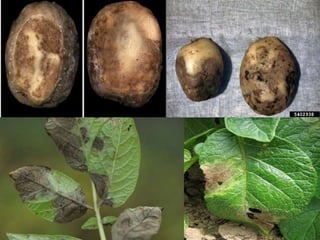Late blight of potato is a serious disease caused by the fungus-like organism Phytophthora infestans. This disease can cause significant yield loss and even complete crop destruction if left unmanaged. In this post, we will discuss the management strategies for late blight of potato, including cultural practices, chemical control, and resistant varieties.
Cultural practices are the first line of defense against late blight of potato. This includes proper field sanitation, crop rotation, and planting disease-free seed potatoes. Sanitation practices such as removing and destroying infected plant debris and avoiding overhead irrigation can help reduce the spread of the disease. Crop rotation with non-susceptible crops, such as corn or beans, can also help reduce the build-up of the pathogen in the soil.
Chemical control is another important management strategy for late blight of potato. Fungicides such as chlorothalonil, mancozeb, and copper-based products can be used to control late blight. It is important to rotate fungicides to avoid the development of fungicide-resistant strains of the pathogen. Fungicides should be applied as a preventive measure, before symptoms appear, and at regular intervals throughout the growing season.
Resistant varieties are another option for managing late blight of potato. These varieties have been bred to be less susceptible to the disease, and can be a valuable tool in reducing the impact of late blight. However, it's important to note that no variety is completely resistant to late blight, and it's always a good idea to rotate different varieties to reduce the risk of disease.
In summary, late blight of potato is a serious disease that can cause significant yield loss if left unmanaged. Cultural practices, chemical control, and resistant varieties are all important strategies for managing the disease. Proper field sanitation, crop rotation, planting disease-free seed potatoes, and the use of fungicides and resistant varieties can help reduce the impact of late blight on potato crops.
Keywords: Late blight of potato, Phytophthora infestans, Yield loss, Crop destruction, Management strategies, Cultural practices, Chemical control, Resistant varieties, Field sanitation, Crop rotation, Disease-free seed potatoes, Fungicides, Chlorothalonil, Mancozeb, Copper-based products, Fungicide resistance, Preventive measures, Potato crop management, Disease management

